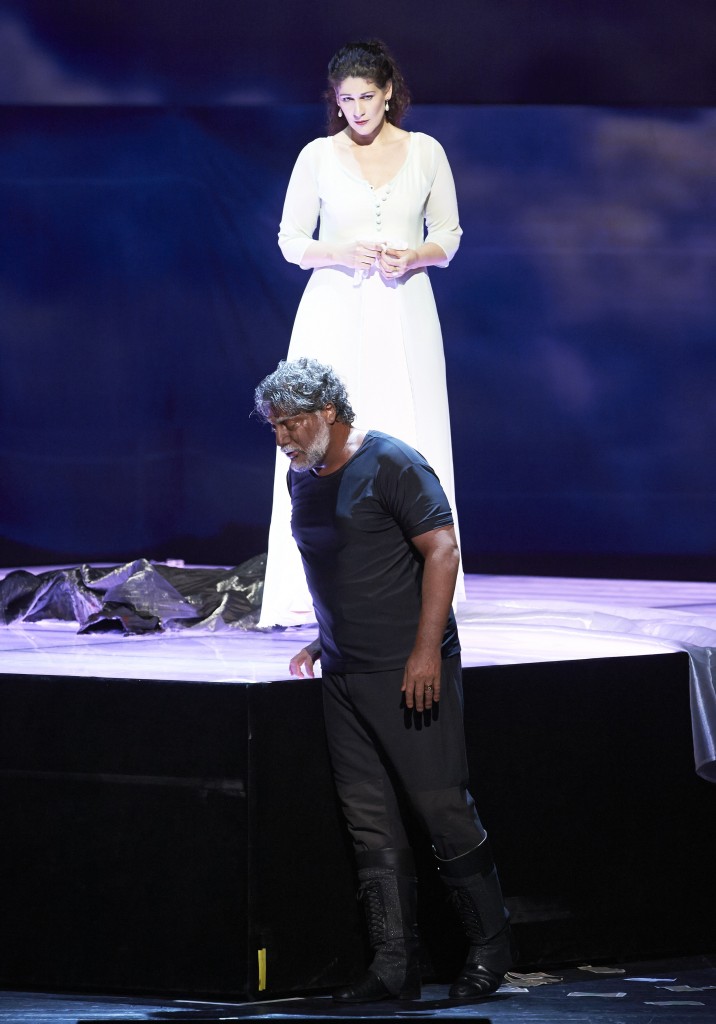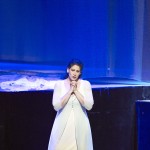 Verdi has transformed Shakespeare’s play into an operatic masterpiece, inspired by the characters, respecting the original plot, but alchemising Shakespeare’s rare metal into a musical drama on a different level. And because Verdi’s orchestration can point up, add to, the musical drama enacted on stage, the opera is surprisingly economical, with no surplus scenes.
Verdi has transformed Shakespeare’s play into an operatic masterpiece, inspired by the characters, respecting the original plot, but alchemising Shakespeare’s rare metal into a musical drama on a different level. And because Verdi’s orchestration can point up, add to, the musical drama enacted on stage, the opera is surprisingly economical, with no surplus scenes.
There’s no overture, but Verdi’s tempestuous orchestration depicting Otello’s ship caught in a storm from Venice, is ominous:’a dark spirit is in the ether.’ The chorus are on tremendous form, as is Vienna State Opera Orchestra under Dan Ettinger.
The minimalist staging (directed by Christine Mielitz), based on a white cube illuminated platform, subtly veils steel- mesh panels for the intimate scenes. The costumes are unfussy, vaguely modern, the sets unproblematic, not distracting. The drama and colour is on stage.
The first surprise is the ‘Iago’ character, dominant from the opening, and in Verdi, more explicit as to his reasons for plotting against Otello. Jago is out for revenge, passed over by Cassio who’s promoted to Captain. Against expectations it is superstar Dmitri Hvorostovsky cursing the thick-lipped Moor. ‘The world of a woman is untrustworthy.’ Jago , the soldier’s man, is a mysoginist, always manipulating women. Although Jago pretends to love Otello, he despises the Moor who demoted him. Hvorostovsky is swaggeringly confident, good looking with long white -platinum hair, dressed in a dark leather coat over black outfit. Verdi’s Jago, unlike Shakespeare’s more abstruse character, openly declares to Rodrigo, ‘If I were the Moor I would be on my guard against Jago.’
We see Cassio (Marian Talaba) swigging from a bottle side stage . He sings of Desdemona as the power of the island, and yet so modest. Jago knows that if Cassio gets drunk he loses it. So Jago rabble-rouses the soldiers to drink , stirs up Rodrigo against Cassio-‘the quarrel to spoil Otello’s first night of love.’ (‘Put down your swords’, thunders Otello; and demotes Cassio.)
Otello (José Cura) is the second surprise- grey-haired, white beard, the older man. A Shakesperean Othello would be negro -an opportunity for under-used black talent- as surely in the elitist opera world. But Cura wins on merit -a moving, disturbing portrayal, magnificently sung. (And, sorry, must a north African be black?) He’s dressed in distressed long black leather, in his first scene with Desdemona. To a long cello solo , Otello sings how, in the black night, his raging heart is subdued; Desdemona (Anja Harteros) of how many hardships preceded their great love. Harteros is a powerful soprano, endearing as Desdemona . Tall, noble, unaffected, dressed in a long , white satin gown, she has a purity of tone, her virtuoso soprano in reserve.
Cura and Harteros are natural, truly complementary. She listened with bliss to his tales of woe, with terror his battles. ‘You loved me for my suffering; I loved you for your compassion.’ In their duet, their loving relationship seems more developed than in Shakespeare. Presciently, ‘his bliss is so great he might never be this happy again.’ Desdemona, centre stage in white, stands over him, soothes his head. Cura’s all in black. These two are very convincingly in love.
Which makes Jago’s treachery all the greater, Jago knowing Otello lives only for her. Jago conspires to advise the now demoted Cassio to persuade Desdemona to intercede for him with Otello. But while Cassio is talking to Desdemona, Jago incites Otello’s jealousy.
 Verdi’s aria for Jago is masterful, modern in its psychological insight into the villain’s motives. Jago from the baseness of an atom, was born wretched, sings defiantly, ‘I am a villain because I am a man and feel the primeval in me.’ And darkly ‘existentialist’, believes man is the plaything of fate, from the cradle to the grave. After so much mockery comes death! And then…Heaven is a myth. It’s a Machiavellian agenda, shockingly modern. Hvorostovsky glowers triumphantly.
Verdi’s aria for Jago is masterful, modern in its psychological insight into the villain’s motives. Jago from the baseness of an atom, was born wretched, sings defiantly, ‘I am a villain because I am a man and feel the primeval in me.’ And darkly ‘existentialist’, believes man is the plaything of fate, from the cradle to the grave. After so much mockery comes death! And then…Heaven is a myth. It’s a Machiavellian agenda, shockingly modern. Hvorostovsky glowers triumphantly.
So, observing Desdemona and Cassio talking, ‘My lord, did Cassio know Desdemona before you married’, Jago asks Otello. – ‘Are you my echo, putting thoughts in my head?'(Otello) Yet, Jago, implanting these insinuations, has the chutzpah to advise Otello, ‘Beware, my lord of jealousy! It is a dark hydra- it poisons with its venom.’ First the investigation, the proof, insists Otello, Cura’s rich tenor.
Desdemona, ‘an honest soul, fails to see deception’ (sing a heavenly choir). Is she too good to be true? So Verdi has children singing- perhaps ironically- Desdemona is ‘like a sacred image they adore’. Yet Desdemona -the epitomy of innocence- unwittingly promotes Cassio’s cause seeking Otello’s pardon. ‘Not now.’-‘Why so irritable.’ What troubles him?’ So Desdemona, guiless, isn’t guiltless. Harteros’s portrayal is all too human, rather than saintly.
In one of the opera’s great ensembles, on opposite sides of the stage, Jago is persuading his wife Emilia to steal a handkerchief from Desdemona, her mistress. Meanwhile Desdemona is trying to soothe Otello. We hear fragments of dialogue, ironically in contrapunct: ‘Suspicion is worse than the crime itself.’ Otello, brooding, wants to be left alone. ( In his aria, sings darkly, this spells the end of Otello’s glory; but wants proof.)
Hvorostovsky, in Act 2’s dream scene, is a highlight. Reacting to Otello’s insistence of proof of Cassio: ‘the terrible deed is always hidden.’ Otello listens intently as Jago relates how he heard Cassio calling out Desdemona’s name in his sleep. ‘Sweet Desdemona, we must hide our love…’ is sung exquisitely, passionately by Hvorostovsky. And ‘I curse the fate that gave you to the Moor’, sung from the heart, as if Hvorostovsky’s Jago is expressing his own feelings. (He is!) The dream faded, finally, Jago’s coup-de-grace, Desdemona’s handkerchief.‘This was the handkerchief in Cassio’s hands.’ Otello’s blood turns to ice: this land shall soon unearth a thunderbolt, Otello swears by the god of vengeance. The scene is a triumph for Hvorostovsky and Cura.
Otello’s interrogation of Desdemona (Act3) is another a high point. The stage is a cage effect, the white square platform -suggesting the marital bed- has a meshed guard in front. Harteros greets him: May God give you joy. He, give me your ivory hand . ‘As yet it bears no traces of pain or age. And with this same hand she gave her heart to him.’ But while he asks her for her handkerchief, she, innocently, wants to speak of Cassio. ‘It was embroidered by a sorceress. Have you lost it?’ Then she, with supreme irony,’You are playing a game with me to distract me from Cassio.’-‘Tell me who you are.’- ‘The faithful wife of Otello.’ Harteros is on her knees, head slumped. He is stalking the cage like a prisoner. She, heartrendingly, ‘behold the first tears (that grief has ever wrung from me.’ He accuses her as a common whore. She’s cowered, shrunken. Then will apologise to her. Still she’s the common whore who is Otello’s wife. She fights him off as she exits. He’s left sobbing painfully. These exchanges (Boito’s libretto) ,shockingly modern, could be from ‘Scenes from a Marriage’. Then Otello’s aria- Cara sitting behind the meshed-wire cage, ‘But you have robbed me of the illusion that nourished my soul.’
 Desdemona’s two arias The Willow Song and Ave Maria are sung by Harteros with great feeling. To an exotic oboe, she requests Emilia lay out her wedding outfit; sings of how a girl once sang, wept with bitter tears, the gloomy willow will be her bridal garland. Then ‘He was born for glory, I was born for love’; and to love him to die. Harteros in white- the guilty Emilia (Monika Bominek) hooded in black -soars ‘Oh, Emilia!’. Harteros’s soprano is tempered with an affecting simplicity, singing Ave Maria. Pray for the sinner, the innocent. Pray for those who bear abuse, suffer tragic fates. Pray for us always, even in the hour of death. Harteros is on a deserted stage, kneeling, a figure of suffering. For once no applause was possible.
Desdemona’s two arias The Willow Song and Ave Maria are sung by Harteros with great feeling. To an exotic oboe, she requests Emilia lay out her wedding outfit; sings of how a girl once sang, wept with bitter tears, the gloomy willow will be her bridal garland. Then ‘He was born for glory, I was born for love’; and to love him to die. Harteros in white- the guilty Emilia (Monika Bominek) hooded in black -soars ‘Oh, Emilia!’. Harteros’s soprano is tempered with an affecting simplicity, singing Ave Maria. Pray for the sinner, the innocent. Pray for those who bear abuse, suffer tragic fates. Pray for us always, even in the hour of death. Harteros is on a deserted stage, kneeling, a figure of suffering. For once no applause was possible.
Dan Ettinger’s double-basses prepare us as Otello approaches her veiled bed- a dark presence violating this spiritual purity . Cura, swarthy in black , cold measured restraint, like a serial killer, ‘If you remember any sin, now’s the time to atone…’ But she insists, she doesn’t love Cassio. The veil collapses. The strangling is very, horribly real.(Emilia arrives announcing Casio has killed Rodrigo. Casio lives.) She dies blameless. Cura, over the body laid out, ‘how pale, silent, beautiful you are: born under an evil star, Desdemona died.’ There is absolute silence in the House. A bassoon bleats mournfully; Otello craves one more kiss before dying. With tenderness and compassion, Verdi expresses the fragility of being human. P.R.20.09.2013
Photos: José Cura (Otello) and Anja Harteros (Desdemona); Dmitri Hvorostovsky (Jago); Anja Harteros (Desdemona); Dmitri Hvorostovsky headline
(c) Wiener Staasoper/ Michael Pӧhn
viennaoperareview.com
Vienna's English opera blog

Your blog site has actually become my go-to resource.
Thanks for taking the time to write such a well-researched
and informative piece.